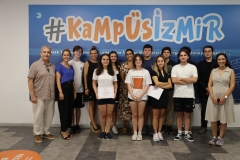
FACULTY OF BUSINESS
Department of International Trade and Finance
ITF 416 | Course Introduction and Application Information
| Course Name |
Insurance Management
|
|
Code
|
Semester
|
Theory
(hour/week) |
Application/Lab
(hour/week) |
Local Credits
|
ECTS
|
|
ITF 416
|
Fall/Spring
|
3
|
0
|
3
|
5
|
| Prerequisites |
None
|
|||||
| Course Language |
English
|
|||||
| Course Type |
Elective
|
|||||
| Course Level |
First Cycle
|
|||||
| Mode of Delivery | - | |||||
| Teaching Methods and Techniques of the Course | - | |||||
| Course Coordinator | ||||||
| Course Lecturer(s) | ||||||
| Assistant(s) | - | |||||
| Course Objectives | To comprehend the significance of risk and insurance management. Evaluate the risk types in insurance industry. Explain the need for capital and its influence on the organisation.Explain the management structures of insurance organisations. Evaluate the role and impact of insurance regulation. Teach the role of risk and investment management in insurance organisations. |
| Learning Outcomes |
The students who succeeded in this course;
|
| Course Description | This course aims to introduce students to the rationale, principles, process and major tools of insurance and risk management. Covered topics include the basic organizational and legal characteristics of insurance industry, concept of risk, risk measurement, how risk management can be applied via insurance industry. |
|
|
Core Courses | |
| Major Area Courses | ||
| Supportive Courses |
X
|
|
| Media and Management Skills Courses | ||
| Transferable Skill Courses |
WEEKLY SUBJECTS AND RELATED PREPARATION STUDIES
| Week | Subjects | Related Preparation |
| 1 | Basic Principles in Risk and Insurance Management | Rejda, George E., Principles of risk management and insurance, 10th ed., Addison-Wesley |
| 2 | Basic Principles in Risk and Insurance Management | Rejda, George E., Principles of risk management and insurance, 10th ed., Addison-Wesley |
| 3 | Legal Principles in Risk and Insurance Management | Rejda, George E., Principles of risk management and insurance, 10th ed., Addison-Wesley |
| 4 | Legal Principles in Risk and Insurance Management | Rejda, George E., Principles of risk management and insurance, 10th ed., Addison-Wesley |
| 5 | Risk Concepts in Insurance | Rejda, George E., Principles of risk management and insurance, 10th ed., Addison-Wesley |
| 6 | Risk Concepts in Insurance | Rejda, George E., Principles of risk management and insurance, 10th ed., Addison-Wesley |
| 7 | Midterm | |
| 8 | Financial Evaluation of Insurance Companies | Rejda, George E., Principles of risk management and insurance, 10th ed., Addison-Wesley |
| 9 | Financial Evaluation of Insurance Companies | Rejda, George E., Principles of risk management and insurance, 10th ed., Addison-Wesley |
| 10 | Process and Risk and Investment Instruments in Insurance | Rejda, George E., Principles of risk management and insurance, 10th ed., Addison-Wesley |
| 11 | Process and Risk and Investment Instruments in Insurance | Rejda, George E., Principles of risk management and insurance, 10th ed., Addison-Wesley |
| 12 | Term Project Presentations | |
| 13 | Term Project Presentations | |
| 14 | Semester Review | |
| 15 | Semester Review | |
| 16 | Final Exam |
| Course Notes/Textbooks | Rejda, George E., Principles of risk management and insurance, 10th ed., Addison-Wesley, ISBN: 978-0-321-46857-4 Book indicated above, presentation notes, current news |
| Suggested Readings/Materials | Domestic and international news, journals covering insurance topics |
EVALUATION SYSTEM
| Semester Activities | Number | Weigthing |
| Participation |
1
|
10
|
| Laboratory / Application | ||
| Field Work | ||
| Quizzes / Studio Critiques | ||
| Portfolio | ||
| Homework / Assignments |
4
|
10
|
| Presentation / Jury |
1
|
10
|
| Project |
1
|
20
|
| Seminar / Workshop | ||
| Oral Exams | ||
| Midterm |
1
|
20
|
| Final Exam |
1
|
30
|
| Total |
| Weighting of Semester Activities on the Final Grade |
8
|
70
|
| Weighting of End-of-Semester Activities on the Final Grade |
1
|
30
|
| Total |
ECTS / WORKLOAD TABLE
| Semester Activities | Number | Duration (Hours) | Workload |
|---|---|---|---|
| Theoretical Course Hours (Including exam week: 16 x total hours) |
16
|
3
|
48
|
| Laboratory / Application Hours (Including exam week: '.16.' x total hours) |
16
|
0
|
|
| Study Hours Out of Class |
16
|
2
|
32
|
| Field Work |
0
|
||
| Quizzes / Studio Critiques |
0
|
||
| Portfolio |
0
|
||
| Homework / Assignments |
4
|
4
|
16
|
| Presentation / Jury |
1
|
10
|
10
|
| Project |
1
|
6
|
6
|
| Seminar / Workshop |
0
|
||
| Oral Exam |
0
|
||
| Midterms |
1
|
12
|
12
|
| Final Exam |
1
|
16
|
16
|
| Total |
140
|
COURSE LEARNING OUTCOMES AND PROGRAM QUALIFICATIONS RELATIONSHIP
|
#
|
Program Competencies/Outcomes |
* Contribution Level
|
||||
|
1
|
2
|
3
|
4
|
5
|
||
| 1 | To be able to identify and analyze problems in the field of trade and finance, and to develop solutions. |
X | ||||
| 2 | To be able to use the theoretical and practical knowledge gained in the field of International Trade and Finance. | |||||
| 3 | To be able to analyze the developments in global markets by using critical thinking skills. | |||||
| 4 | To be able to analyze and interpret data in the field of finance, commerce and economics by using information technologies effectively. | |||||
| 5 | To be able to acquire knowledge about the legal regulations and practices in the field. | X | ||||
| 6 | To be able to foresee and define the risks that could be encountered in the field of trade and finance and to take decisions to manage such risks. | X | ||||
| 7 | To be able to acquire and use verbal and numerical skills necessary for the nature of international trade and finance program. | |||||
| 8 | To be able to obtain, synthesize and report the information related to the fields of trade and finance. | |||||
| 9 | To be able to contribute to the solution of problems as individual, team member or leader. | |||||
| 10 | To be able to evaluate the issues related to the field with an ethical perspective and social sensitivity. |
X | ||||
| 11 | To be able to collect data in the areas of International Trade and Finance and communicate with colleagues in a foreign language ("European Language Portfolio Global Scale", Level B1). | |||||
| 12 | To be able to speak a second foreign at a medium level of fluency efficiently. | |||||
| 13 | To be able to relate the knowledge accumulated throughout human history to their field of expertise. | |||||
*1 Lowest, 2 Low, 3 Average, 4 High, 5 Highest
NEWS |ALL NEWS

Aiming for Poland
Izmir University of Economics (IUE) students made it to the finals of the ‘Research Challenge’ organized by the CFA Institute, one of

Sustainable Finance Summer School
Sustainable Finance Summer School, designed for high school students within the body of İzmir University of Economics, EKOSEM, was held on August

‘Regional Championship’ is the goal
The team of 5, consisting of students of Izmir University of Economics (IUE), made it to the finals in the ‘Research Challenge’

Reputable membership to IUE from the UK-based institute
The UK-based CFA Institute, which is considered one of the most respected institutions in the finance sector, has included the Department of

Prof. Küçüközmen gave a speech on the Cyber Risks to EKOTÜRK
Faculty member of IUE Department of International Trade and Finance, Prof. Küçüközmen commented on the cyber risks to EKOTÜRK TV.

Prof. Dr. C. Coşkun Küçüközmen said 'İzmir should be a Fintech Center'
One of the professors of our department, Prof. Dr. C. Coşkun Küçüközmen, in his interview with the 9 Eylül Newspaper, evaluated that

Prof. Dr. C. Coşkun Küçüközmen; “Filling up your car with ‘50 Lira gasoline’ cannot take you back home”
One of the professors of our department, Prof. Dr. C. Coşkun Küçüközmen evaluated the price hikes on fuel in an interview with

Prof. Dr. C. Coşkun Küçüközmen; 'Turkey Can End the War With Its Historical Power'
One of the professors of our department, Prof. Dr. C. Coşkun Küçüközmen evaluated the Ukraine-Russia war and its effects in a special



